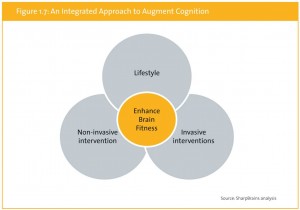Brain Fitness: Definition, Priorities, and Links to Neuroleadership and Human Capital
 Yesterday we had a fun session on Brain Fitness during the Neuroleadership Summit taking place now in San Francisco, exploring opportunities to enhance performance and health of leaders and workforces by deploying both old tools (like breathing and meditation) and new ones (such as biofeedback and database-driven personalized brain training solutions). Here are a couple of the main ideas I wanted to introduce:
Yesterday we had a fun session on Brain Fitness during the Neuroleadership Summit taking place now in San Francisco, exploring opportunities to enhance performance and health of leaders and workforces by deploying both old tools (like breathing and meditation) and new ones (such as biofeedback and database-driven personalized brain training solutions). Here are a couple of the main ideas I wanted to introduce:
A. Let’s define Brain Fitness as an “integrated approach to enhance brain functionality”, combining as appropriate lifestyle, invasive and non-invasive options. “Brain fitness” is above all an outcome, a culture, similar to “physical fitness” (jokingly, I also said that “brain fitness” is the part of “physical fitness” that “physical fitness” doesn’t yet know what to do with)
B. Then, the question becomes, “what are the most important brain functions to enhance/ develop/ maintain?”. Here I shared the following results from  the survey included in our 2010 market report. When asked, “How important do you believe are the following brain functions to thrive personally and professionally in the 21st century?”, 2,000 respondents ranked answers this way (you can click on chart to maximize size):
the survey included in our 2010 market report. When asked, “How important do you believe are the following brain functions to thrive personally and professionally in the 21st century?”, 2,000 respondents ranked answers this way (you can click on chart to maximize size):
- Ability to manage stressful situations
- Concentration power to avoid distractions
- Being able to recognize and manage one’s emotions
- Processing new information quickly
- Defining and pursuing personally meaningful goals
- Being able to monitor and manage one’s thought processes
- Ability to deal with new, uncertain situations
- Planning ahead and solving problems in systematic ways
- Ability to multi-task
- Remembering faces and names
(Note: this survey wasn’t designed to represent the current views of population at large, but of the early-adopters who subscribe to our monthly enewsletter and may give us a better peak into where we are heading into.)



This is a very interesting website … I’ve never come across one that studies the fitness of the brain. Great articles.
Indeed, this is still a leading-edge area, but with tons of growth in all fronts: consumer and professional demand, research, products and services…just think how “physical fitness” itself has evolved over the last 50 years.